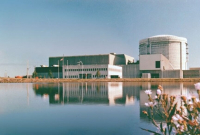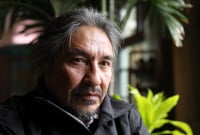Support strong Canadian climate journalism for 2025
Leaders from the Gitxaała and Gitanyow First Nations are celebrating a historic victory after the Supreme Court of British Columbia ruled the province’s laws on mining stakes did not meet the Crown's duty of consultation.
The court challenge opposed the laws that let exploration companies stake claims without prior consent, often for as low as $60. The judge found that the duty to consult is triggered when a mining stake is claimed in the province.
However, it’s unclear whether the ruling will impact other provinces.
For Naxginkw (Tara Marsden), Wilp sustainability director for the Gitanyow Hereditary Chiefs, the reaction to the case is a “mixed bag.”
On one hand, there is relief regarding the duty to consult for mineral tenures. On the other hand, Naxginkw said there was some “disappointment” in what she called the court’s “really minimal interpretation” of the United Nations Declaration on the Rights of Indigenous Peoples (UNDRIP) and the Declaration on the Rights of Indigenous Peoples Act’s (DRIPA) legal weight on the law in the province.
Naxginkw also called out the court’s permission to allow mineral exploration companies to continue operating under the old law for 18 months.
The court’s decision sets a precedent in the province for a “very narrow interpretation” of UNDRIP.
The decision could be a sign of things to come for court challenges citing the federal government’s legislation that enshrines the United Nations’ declaration.
On Tuesday, chiefs from First Nations in Ontario descended on Queen’s Park in Toronto for a press conference slamming Premier Doug Ford for not achieving free, prior and informed consent, a central tenet of the declaration.
The press conference was held under the united banner of the Land Defence Alliance, a coalition formed in response to a surge of mining claims on traditional territories. The alliance says Ford has allowed about 5,000 claims to be staked without their consent or consultation.
B.C.’s Mineral Tenure Act was passed during the Gold Rush in the late 1800s and remains a colonial carryover, Jessica Clogg, one of the lawyers representing the Gitxaała Nation, said in a previous interview.
As time progressed, it has actually become even easier for mining claims to be made. In the past, miners had to physically put a stake in the ground to be authorized by the Crown. Now, with a few clicks on an online portal, stakes can be made from the comfort of a desk, Clogg explained.
“Gitxaała has won an important victory for every [First Nation] across B.C.,” said Simogyet Malii, Gitanyow hereditary chief, in a press release. “The gold rush is over. Industry and government must align with the new era of sustainable mining that respects Indigenous rights to consent.”
The court ruled in favour of Gitxaała Nation, with Gitanyow standing as an intervenor in the case.
Located on the northern coast of British Columbia, Gitxaała based its legal challenge on the province’s 2019 Declaration of Indigenous Peoples Rights Act, which enshrines the United Nations Declaration on the Rights of Indigenous Peoples in B.C. law.
However, in his decision, Justice Alan Ross found that DRIPA “does not implement UNDRIP into domestic law in B.C.,” nor does it “create justiciable rights,” according to the decision.
Instead, DRIPA was used by Justice Ross as an “interpretive aid.”
“Here we have governments consistently trying to water down international standards,” Naxginkw explained.
Naxginkw does not think the province will appeal to the Supreme Court of Canada, however, it’s still unclear if the First Nations will want to appeal the judge’s interpretation of DRIPA.
"[The Association of Mineral Exploration] is focused and energized by the process in front of us - the multi-generational opportunity to modernize the Mineral Tenure Act," Keerit Jutla, President & CEO, Association for Mineral Exploration, said in a statement.
— With files from Abdul Matin Sarfraz
Matteo Cimellaro / Canada’s National Observer / Local Journalism Initiative
A previous version of this article stated that the judge ruled that the Mineral Tenure Act in British Columbia was unconstitutional. In reality, the judge ruled that the Mineral Tenure Act did not meet the Crown's duty to consult with First Nations.
The article was also updated to reflect comment from the Association of Mineral Exploration.







Comments
I suspect that BC is unlikely to appeal because the SCC -- assuming the case went that far -- could very well provide a decision that more strongly supports First Nations' rights over their territories.
I do have the impression that BC provincial courts have often been more hostile to indigenous rights than the Supremes.
Some weasly wording in the act, perhaps.
I'd like to see the Reasons for Judgment when they come out.